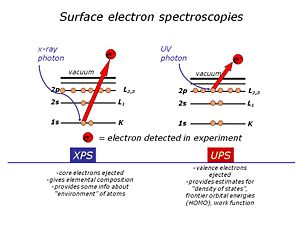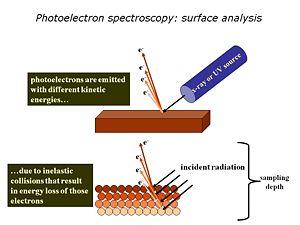Difference between revisions of "Photoelectron Spectrometer XPS and UPS"
Jump to navigation
Jump to search
Cmditradmin (talk | contribs) |
Cmditradmin (talk | contribs) |
||
| Line 1: | Line 1: | ||
X-ray Photoelectron Spectroscopy and UV Photoelectron Spectroscopy are techniques for studying the surface characteristic of materials. | |||
===What is the Problem?=== | ===What is the Problem?=== | ||
OLEDs and OPVs consist of thin films of organic materials, sandwiched between contacting electrodes. We need analytical tools which tell us: | OLEDs and OPVs consist of thin films of organic materials, sandwiched between contacting electrodes. We need analytical tools which tell us: | ||
*Elemental composition of metal, metal oxide and organic surfaces (top 1-10 nm) | *Elemental composition of metal, metal oxide and organic surfaces (top 1-10 nm) | ||
| Line 7: | Line 9: | ||
===What is our approach? Physics of XPS and UPS=== | ===What is our approach? Physics of XPS and UPS=== | ||
[[Image:Surface_electron_spectroscopies.jpg|thumb|right|300px |XPS uses high energy X-ray photons to excite “core” electrons in the near-surface region UPS uses lower energy photons in the deep UV region to excite valence electrons.]] | |||
We use high-vacuum surface electron spectroscopies: X-ray photoelectron spectroscopy and UV-photoelectron spectroscopy to provide the elemental, molecular and energetic information we require about these materials. | We use high-vacuum surface electron spectroscopies: X-ray photoelectron spectroscopy and UV-photoelectron spectroscopy to provide the elemental, molecular and energetic information we require about these materials. | ||
Revision as of 08:22, 22 April 2009
X-ray Photoelectron Spectroscopy and UV Photoelectron Spectroscopy are techniques for studying the surface characteristic of materials.
What is the Problem?
OLEDs and OPVs consist of thin films of organic materials, sandwiched between contacting electrodes. We need analytical tools which tell us:
- Elemental composition of metal, metal oxide and organic surfaces (top 1-10 nm)
- The molecular state of those elements in that same region
- The frontier orbital energies which control rates of charge transfer, photopotentials, onset voltages, etc.
What is our approach? Physics of XPS and UPS
We use high-vacuum surface electron spectroscopies: X-ray photoelectron spectroscopy and UV-photoelectron spectroscopy to provide the elemental, molecular and energetic information we require about these materials.

